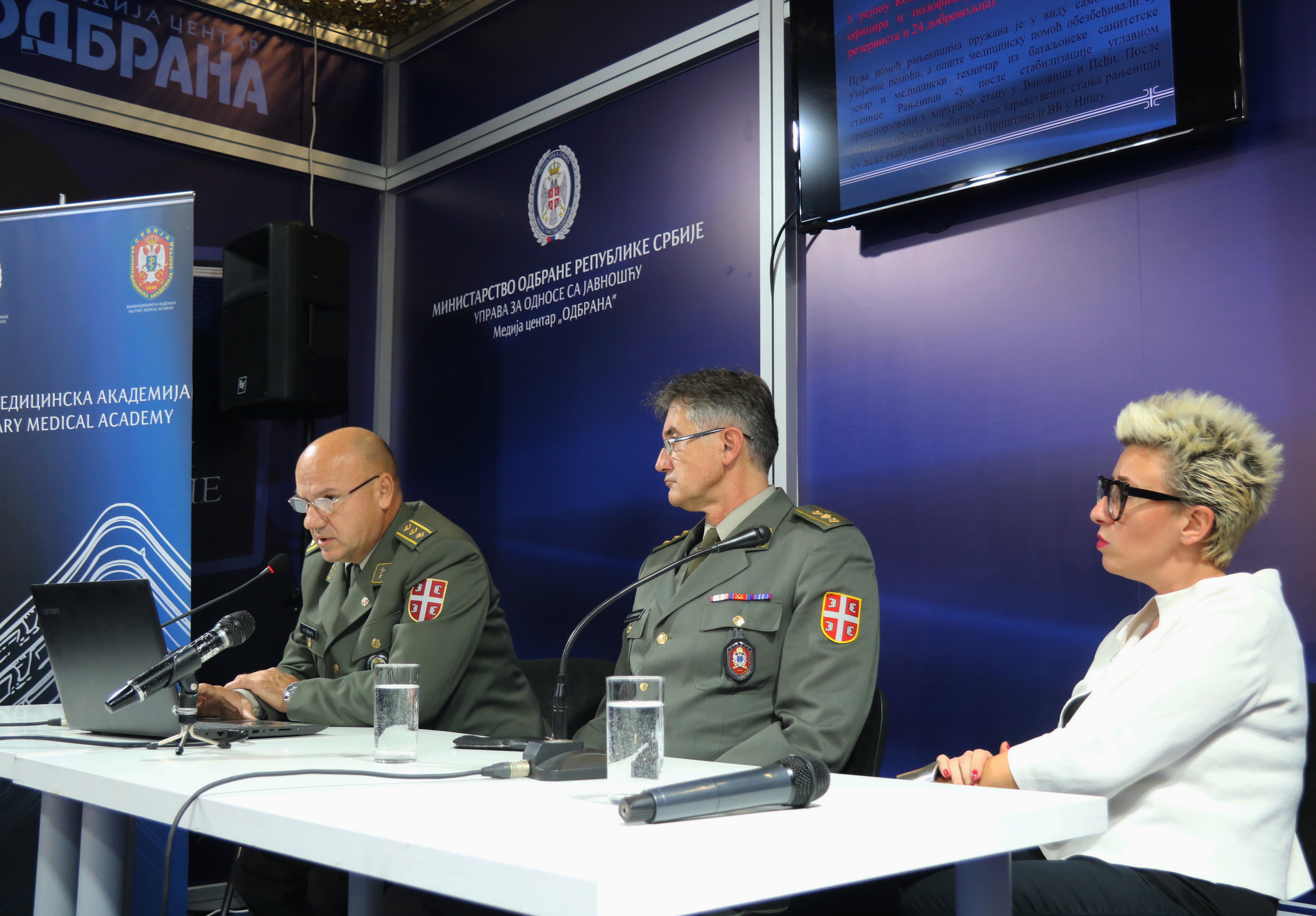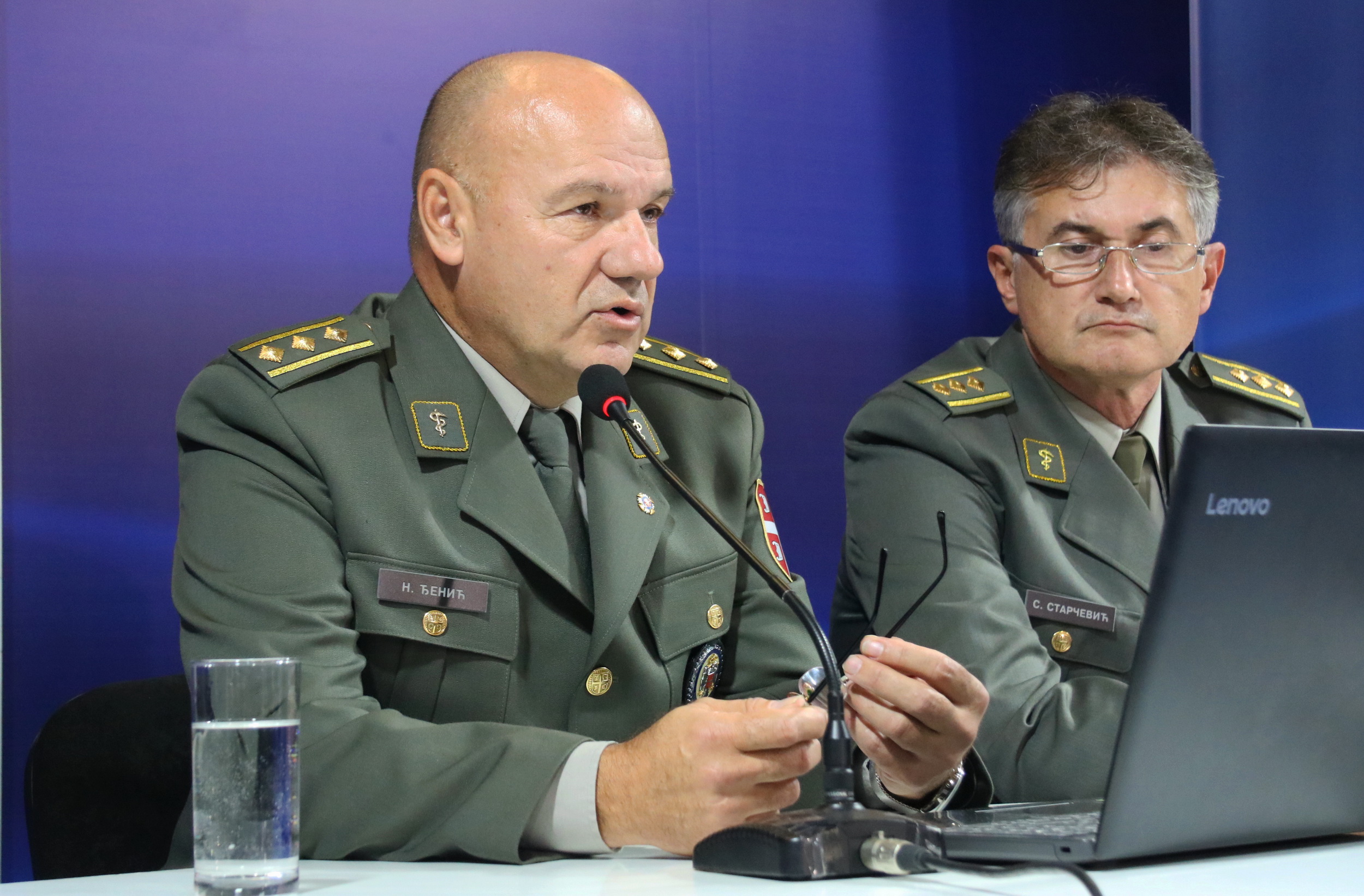22.10.2019.
Public Debate “Experiences from Engagement of Yugoslav Army Medical Service Capacities during NATO Aggression against the FRY in 1999” Held at the Book Fair
The stand of the Ministry of Defence and Serbian Armed Forces at 64th International Book Fair in Belgrade, was the venue for holding a public debate “Experiences from Engagement of Yugoslav Army Medical Service Capacities during NATO Aggression against the FRY in 1999” in the day dedicated to Military health.
The speakers Colonel Nebojša Đenić MD from Military Hospital in Niš and Colonel Srđan Starčević MD from the Military Medical Academy spoke at the public debate about the experiences of military medical service back in 1999.
 - In those years of war, the organisation of Medical Service of Serbian military was highly complex but efficient as well. Statistical data gathered in the field, from the border and Košare, over Đakovica and Kosovo and Metohija in general, to the Military Hospital in Niš and the MMA in Belgrade, where the greatest number of the wounded was treated at that time, point to the fact that the performance of the Medical Service was at an enviable level – Colonel Đenić estimated recollecting difficult conditions in which the doctors of then Yugoslav Army had worked in the field. Speaking about the quality of the treatment of the wounded during circumstances of war in 1999 Đenić presented data according to which the patients treated by the military Medical Service had been among the most appropriately treated in comparison to all medical services engaged during NATO aggression against the Federal Republic of Yugoslavia, which is attributed to supreme competence, professionalism and experience of military medical staff.
- In those years of war, the organisation of Medical Service of Serbian military was highly complex but efficient as well. Statistical data gathered in the field, from the border and Košare, over Đakovica and Kosovo and Metohija in general, to the Military Hospital in Niš and the MMA in Belgrade, where the greatest number of the wounded was treated at that time, point to the fact that the performance of the Medical Service was at an enviable level – Colonel Đenić estimated recollecting difficult conditions in which the doctors of then Yugoslav Army had worked in the field. Speaking about the quality of the treatment of the wounded during circumstances of war in 1999 Đenić presented data according to which the patients treated by the military Medical Service had been among the most appropriately treated in comparison to all medical services engaged during NATO aggression against the Federal Republic of Yugoslavia, which is attributed to supreme competence, professionalism and experience of military medical staff.Colonel Starčević underlined that the war surgery was the most difficult because the injuries were caused by modern war means were horrendous.
 - In the nineties’ we gained significant knowledge in surgery, unfortunately on no other place than in the field. It is well-known fact that the best school of surgery is the very war surgery. Until 1999, I had gain sufficient practical experience and I thought that I had seen it all. And yet, it was not so. I was a member of an on-duty team when the hospital “Dragiša Mišović” was bombarded in Belgrade. Injuries that soldiers sustained that night were something that I saw for the first time, since, in similar situations, hospital receives the wounded who have already been treated in some way. However, those soldiers received just necessary first aid and they were immediately sent to hospital – Colonel Starčević revived the experience from the war 1999 year, agreeing with his colleague from the Military Hospital in Niš that the war surgery played equally important role in peacetime circumstances as well, having in mind that owing to numerous experiences gained in emergencies, it was ready for situations with which civilian medical workers did not have frequent contact.
- In the nineties’ we gained significant knowledge in surgery, unfortunately on no other place than in the field. It is well-known fact that the best school of surgery is the very war surgery. Until 1999, I had gain sufficient practical experience and I thought that I had seen it all. And yet, it was not so. I was a member of an on-duty team when the hospital “Dragiša Mišović” was bombarded in Belgrade. Injuries that soldiers sustained that night were something that I saw for the first time, since, in similar situations, hospital receives the wounded who have already been treated in some way. However, those soldiers received just necessary first aid and they were immediately sent to hospital – Colonel Starčević revived the experience from the war 1999 year, agreeing with his colleague from the Military Hospital in Niš that the war surgery played equally important role in peacetime circumstances as well, having in mind that owing to numerous experiences gained in emergencies, it was ready for situations with which civilian medical workers did not have frequent contact.



